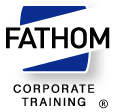Here at Fathom, we are in a unique position to take note of the latest significant trends and professional development challenges that our clients are facing in the corporate training world. Some of the trends that we are following lately are converging around a central theme in an interesting way.
Four generations are now sharing the workplace for the first time in history: Traditionalists, Baby Boomers, Generation X and Millennials. Without a doubt, the group that is shaking up the corporate world the most right now are the Millennials.
In fact, Millennials are expected to account for 36 percent of the U.S. workforce next year, and nearly half of all U.S. workers by 2020, according to the American Society for Training and Development. As a result, they are prompting development of training courses to help established managers learn to adapt to, and gain value from, the unique traits and characteristics of the Millennials.
Additionally, the typical habits of the Millennial generation have spurred the need for more time management training, due to their tendencies toward multitasking while texting, chatting online, emailing and more. This is an emerging area of study that we will dive into a little deeper next time.
And finally, a trend that continues to gain momentum is the explosion of online learning through digital presentations and webcasts. The two largest factors driving this trend are: 1) the economy, with companies still wary about increasing travel budgets, and 2) the younger generation’s preference for digital communication.
One constant in the corporate world is that change happens! We will continue to keep you updated on professional development trends as they emerge and evolve. Be sure to check back regularly to see what new courses are available to help you adapt to the changing workplace.
John Males is Founder and President of Fathom Corporate Training. With more than 20 years of experience in management, sales and negotiations, he helps clients increase employee satisfaction, lower turnover, increase revenue and raise profit margins.

